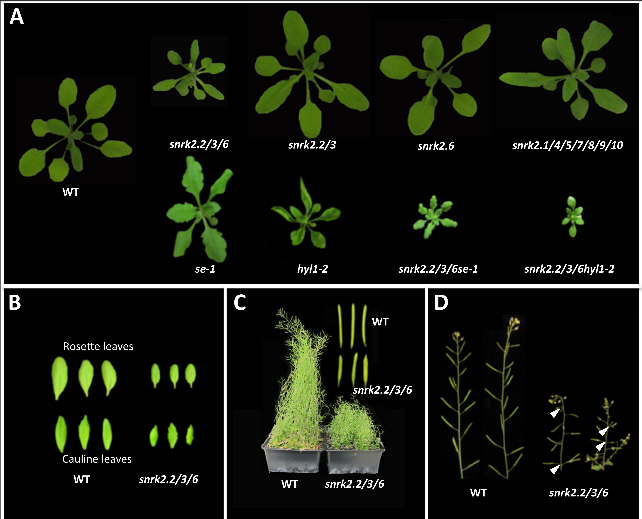
MicroRNAs (miRNAs) are non-coding RNAs that impact various biological processes by regulating mRNA cleavage or translation in a sequence-specific manner. Mature miRNAs are generated by the miRNA processing complex.
In plants, the core components of miRNA processing complex include the RNAse III enzyme DICER-LIKE 1 (DCL1), the zinc finger protein SERRATE (SE) and the double-stranded RNA binding protein HYPONASTIC LEAVES (HYL1).
Previous studies have discovered important roles of protein phosphorylation in regulating miRNA biogenesis in Arabidopsis. However, little is known about the kinases that may phosphorylate and regulate the core components of the Arabidopsis miRNA processing complex.
The research group led by Prof. ZHU Jiankang at Shanghai Institute of Plant Physiology and Ecology of Chinese Academy of Sciences, collaborating with researchers at Purdue University, found that the SnRK2 protein kinases phosphorylate HYL1 and SE and modulate mRNA biogenesis. The study was published in PLoS Genetics.
The family of ten redundant members of SnRK2 protein kinases is the central components of abscisic acid (ABA) and osmotic stress signaling pathways. SnRK2.2, 2.3 and 2.6 acts redundantly in ABA regulation of stomatal closure, seed germination and seedling growth, and virtually all examined ABA responses are eliminated in snrk2.2/2.3/2.6 triple mutants.
Interestingly, the snrk2 decuple mutant displays severe growth defects in soil and in culture media under osmotic stress and shows great reduction in osmotic-stress induced responses. Researchers showed that inactivation of functionally redundant members of the SnRK2 kinases leads to reduction in miRNA accumulation under stress conditions. Further analysis revealed that the steady state level of HYL1 protein in plants under osmotic stress is dependent on the SnRK2 kinases.
The results suggested that the SnRK2 kinases physically associate with the miRNA processing components SE and HYL1 and can phosphorylate these proteins in vitro. They also revealed the important role of the SnRK2 kinases in the regulation of miRNA accumulation and established a mechanism by which ABA and osmotic stress signaling is linked to miRNA biogenesis.
This research is supported by the Chinese Academy of Sciences.

A novel function of SnRK2 protein kinases in regulation of miRNA biogenesis (Image by ZHU Jiankang's group)

86-10-68597521 (day)
86-10-68597289 (night)

86-10-68511095 (day)
86-10-68512458 (night)

cas_en@cas.cn

52 Sanlihe Rd., Xicheng District,
Beijing, China (100864)

